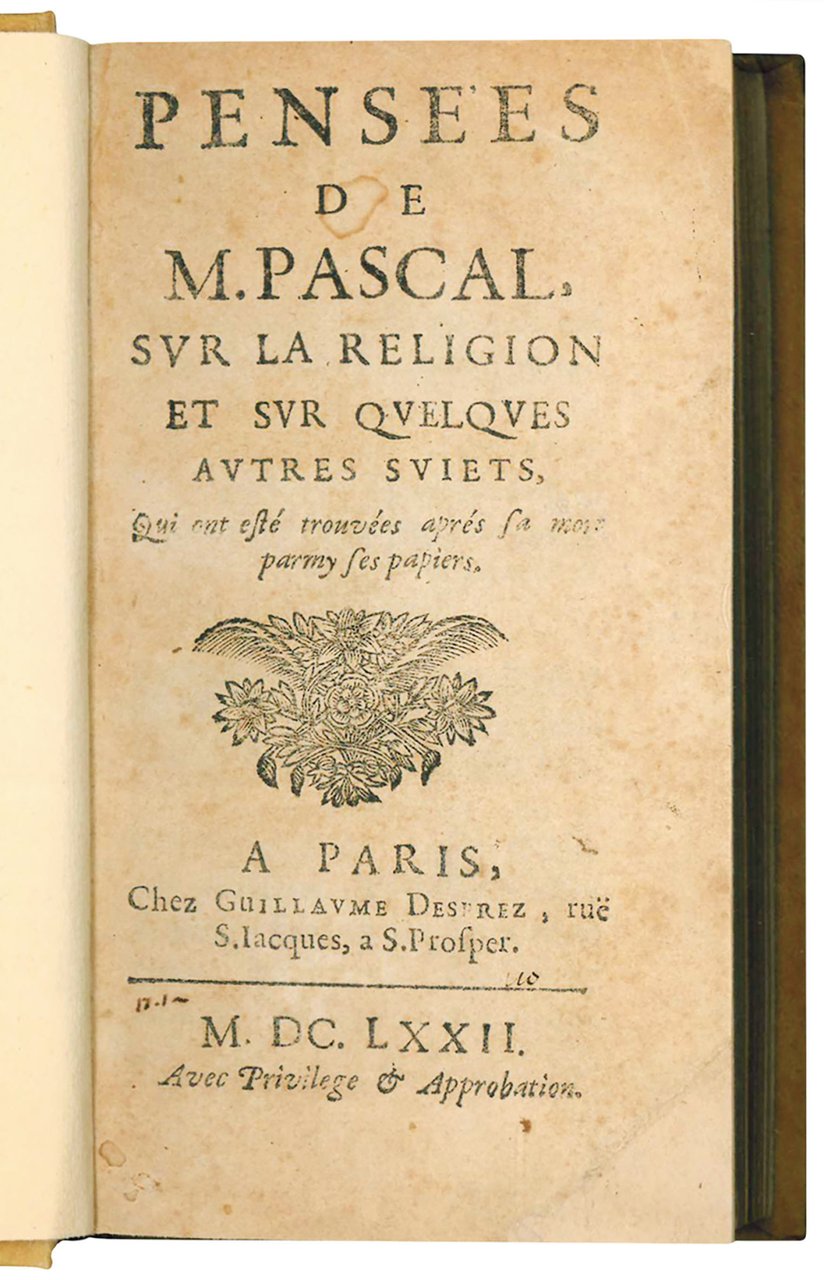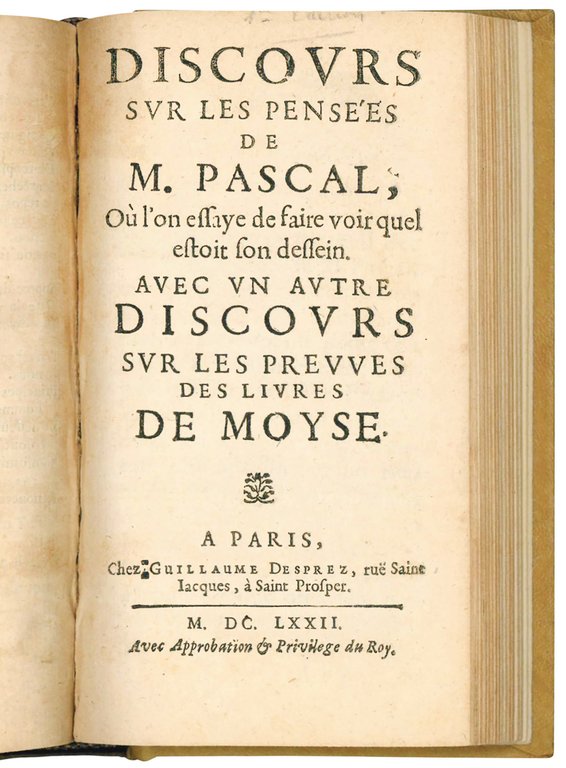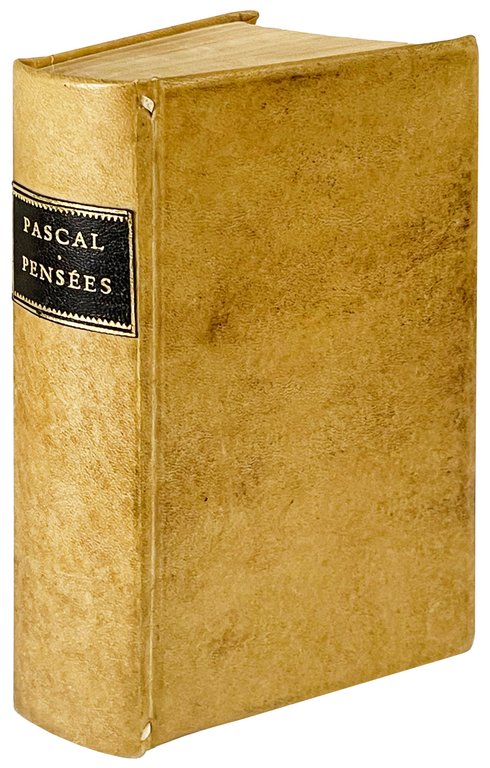Pensées de M. Pascal sur la religion et sur quelques autres suiets, qui onestè trouvées après sa mort parmy ses papiers
Pensées de M. Pascal sur la religion et sur quelques autres suiets, qui onestè trouvées après sa mort parmy ses papiers
Mode de Paiement
- PayPal
- Carte bancaire
- Virement bancaire
- Pubblica amministrazione
- Carta del Docente
Détails
- Année
- 1672
- Lieu d'édition
- Paris [i.e. Lyon?]
- Auteur
- PASCAL, Blaise (1623-1662)
- Éditeurs
- Chez Guillaume Desprez, ruë S. Iacques, à S. Prosper [but Ad
- Thème
- seicento
- Etat de conservation
- En bonne condition
- Langues
- Italien
- Reliure
- Couverture rigide
- Condition
- Ancien
Description
[Bound with] [FILLEAU DE LA CHAISE, Nicolas (1631-1688)]. Discours sur les pensées de M. Pascal, ou l'on essaye de faire voir quel estoit son dessein. Avec un autre discours sur les prevues des livres de Moyse. Paris, Chez Guillaume Desprez, ruë S. Iacques, à S. Prosper, 1672.
Two works in one volume, 12mo (142x75 mm). [82], 365, [21]; 163, [3] pp. Collation: a¹², e¹², o¹², A-Q¹², R6; A-G¹². Lacking l. G12, a blank. With woodcut vignette on the first title page, woodcut initials, head- and tail-pieces. Modern stiff vellum, gilt title on black morocco lettering piece on spine. On the first title page bottom right corner repaired and small hole at the bottom left not affecting the text, slightly uniformly browned. A good copy.
Rare Lyon counterfeit of the first edition of Pascal's Pensées, possibly published by Adam Demen from the typographical material, but not recorded by J. Guilbaud (Le ‘revers' d'un succès de librairie: les contrefaçons lyonnaises de la première édition des Pensées de Pascal 1670 et 1675', in: “Histoire et civilisation du livre”, 2, 2006, pp. 113-123), bound together with the first edition of Nicolas Filleau de la Chaise's Discours sur les Pensées de M. Pascal.
The first edition of the Pensées was published in January 1670, eight years after Pascal's death. It was prepared between 1667 and 1668 by a committee of Jansenist relatives and friends of the author, including Antoine Arnauld, Pierre Nicole, Étienne Périer (Pascal's brother-in-law) and Françoise Gilberte Périer (Pascal's sister), who gathered and edited Pascal's scattered papers, imposing to them an arbitrary structure and dividing them into large thematic groups. In March 1670 a second edition appeared in two different issues with the text corrected. A very rare so-called ‘pre-original' edition, published in Paris in the summer of 1669 by G. Desprez, submitted to the ecclesiastical authorities and proofreaders for approval, is known in only two copies. Several were also the counterfeit editions appeared soon after the publication of the first edition.
The Pensées opens with a general preface, which outlines the structure and lays the foundations of the work. A first part, ‘Man without God', in which Pascal describes man's misery, his place in nature between the two infinities ‘the Whole and the Nothing', the habit that enslaves, the imagination that deceives, the self-love that seduces, the amusement that distracts, and finally the affirmation of the need to seek God. A second and final part, ‘Man with God', divided into three chapters in which Pascal refutes the theories of the ancient philosophers (Stoics, Epicureans, Dogmatists and Pyrrhonists), affirms the contradiction and blindness of Judaism, describes the true religion, proposes his famous ‘bet', distinguishes interiority-exteriority and discusses the means of faith. Then, are explained the proofs of Christianity that would make it superior to any other religion or philosophy, dividing them into prophecies, miracles, perpetuity, the holiness and morality of true Christians, and reason: in fact, only the grace of Christ can give reason for our misery. Finally, in the last section of the book, Pascal wrote of the Church, its supernatural foundation and strength, and its doctrinal infallibility, coordinated by the Pope. So, what are the Pensées? They are not a mere defence of orthodoxy, nor an appeal to faith and much less do they conceal free thought. Also, when he attacks the rationalism of Descartes or the scepticism of Montaigne, he does so with Cartesian methods of reasoning and Montaigne's style.
To rational scepticism, Pascal proposes a deeper scepticism, which he calls Pyrrhonism. If the sceptic denies everything that cannot be proved by reason, Pascal also denies the power of reason, whose ability lies only in the power of God. ‘Cogito, ergo sum' is only true if there is a being who can give existence and thought. Thus, he explains human experience entirely in terms of faith and revela



